RICHARD’S REVIEWS FOR OCT 24, 2014 W “CANADA AM” HOST MARCI IEN.
 “Canada AM” film critic Richard Crouse reviews “John Wick,” “Whiplash” and “Birdman.”
“Canada AM” film critic Richard Crouse reviews “John Wick,” “Whiplash” and “Birdman.”
Watch the whole thing HERE!
 “Canada AM” film critic Richard Crouse reviews “John Wick,” “Whiplash” and “Birdman.”
“Canada AM” film critic Richard Crouse reviews “John Wick,” “Whiplash” and “Birdman.”
Watch the whole thing HERE!
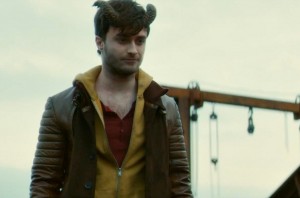 By Richard Crouse – Metro Canada
By Richard Crouse – Metro Canada
Courtesy Lionsgate Daniel Radcliffe’s character discovers he has acquired dark new powers in “Horns.”
“The book is a really unhappy, paranoid novel by a really unhappy, paranoid man,” says author Joe Hill of his thriller Horns, now a movie starring Daniel Radcliffe as a man who grows devil horns after he’s accused of murdering his girlfriend.
“I wasn’t in a great place mentally when I wrote it, (but) I’m very proud of Horns. I think it’s a really fun novel.
“I had tremendous success with Heart Shaped Box and I fell into that cliché, the second novel trap. I wrote 400 pages of a novel I threw away. It was called The Surrealist Glass and it didn’t work. It was no good. Although in some ways the Surrealist Glass was the first draft of Horns because there were ideas and elements and even one or two chapters that were almost lifted wholesale and slotted into Horns.”
The book finally came into focus when Hill, the son of none other than Stephen King, remembered a line he once read in a review of a sci-fi movie: ‘This movie doesn’t quite succeed because it isn’t about anything except itself.”
“The science-fiction film (that the critic) was talking about was a prequel to a well-known franchise about trade federations and robots blowing each other up,” says Hill, the eldest son of horror legend Stephen King, “and it wasn’t about anything except lasers, guns and robots. It didn’t ask any of the great, almost unanswerable questions that people turn to fiction to explore.
“The one thing I always look for in a story is for it to have some sort of internal life.
“To be about something more than just a ghost or a vampire or a devil; to ask some kind of interesting question so it is about something bigger than itself. That’s very possible to do in fantasy.
“I think any story about the devil is the same way. What happens when all the dirty secrets come out? What would it be like to be tempted by the things you fear most?”
The resulting book earned critical praise — Publisher’s Weekly called it a “compulsively readable supernatural thriller” — and snagged him a Bram Stoker Award nomination for best novel. “Now when he’s asked what he thinks of Alexandre Aja’s film adaptation of his “unhappy, paranoid novel” he is effusive.“I think the film is wonderful,” he says.
“It has a lot of cross-genre elements. It’s funny. It has romance. It has a tragic aspect. It has a horror movie aspect to it.
“Someone asked me when I was in Toronto for the premiere, ‘What genre is it?’, and I said, ‘It’s a tragecomehorredy.’ I have no idea what the rest of the world will make of it, but I think it’s a lot of fun.”
 By Richard Crouse – Metro Canada
By Richard Crouse – Metro Canada
In the new David Cronenberg film Maps to the Stars, Julianne Moore plays actress Havana Segrand.
A child of Hollywood, she’s the daughter of a movie star who became a star herself but is now, as Moore says, “monstrous and childlike.”
Havana is a bundle of exposed ego and neurosis, a Hollywood stereotype, but Moore promises she’s not based on anyone in particular.
“I swear to you she sprung to life from the page,” she says.
“That was what was great about it. (Screenwriter) Bruce Wagner’s language is so precise, so spectacular, so emotional; it was almost like poetry.
“There was a rhythm to it. I could hear her voice in the rhythm of the speech and how things were supposed to be delivered.
“The key to Havana for me was her arrested development. She’s stuck at the age her mother died. She’s so childlike.
“Everything is all about her mother and not being parented. All this childish, even sexpot behaviour — the ‘Look at me!’ — is all about not being parented. That’s all she wants.”
The film is a wonderfully sadistic portrait of Tinsel Town and its citizens, portraying the wild side of Los Angeles where venal and stratospherically self-involved behaviour plays itself out on the public stage. It’s a dark picture of life in Hollywood, but longtime New York City resident Moore says the conduct isn’t exclusive to the movie biz.
“I‘m sure there can be a certain kind of permissiveness in any business,” she says, “on Wall Street and Silicon Valley and in certain socialite circles.
“People try and pin it on Hollywood as the only place it happens, and of course, it’s not.
“I only lived in L.A. for a while in the ’90s. There was a different quality to socializing than I had ever seen before. I’m pretty bourgeois. I’m not a partier. I don’t really go out, but when I moved to L.A. there was a degree of socialization. I was like, ‘Whoa, there’s a lot of parties out here.’
“I was also single and out in a way I hadn’t been before. Very soon after that I met my husband, we had children and I went right back into my hole.”
She does, however, go out from time to time.
“I have a school event later tonight,” she laughs as we end the interview.
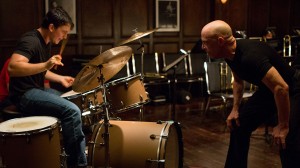 By Richard Crouse – Metro Canada
By Richard Crouse – Metro Canada
The new film Whiplash draws inspiration from the famous story of Jo jones and Charlie Parker. Jones famously threw a cymbal at Parker after a lackluster solo, prompting the sax player to go away in shame, practice for a year and return as one of the greatest musicians of the twentieth century.
Sitting in for Jones is Terence Fletcher (J.K. Simmons), a teacher at an upscale music college. He’s a perfectionist who uses a toxic mix of fear and intimidation to push Andrew (Miles Teller) toward his dream of becoming the best jazz drummer of all time.
“A lot of musicians had a guy like me in their background,” says Simmons, who is as affable off-screen as his character is tyrannical onscreen. “I get musicians saying that they had a teacher or a conductor who was at least as hard core (as I am in the movie). Either that or coaches. For me it was a football coach. You look back and think, ‘What a psycho. He wouldn’t back off.’”
The actor has yet to meet a teacher who condones Fletcher’s methods, but says people did relate to another of his characters, the sadistic neo-Nazi inmate Vernon Schillinger.
“Oddly I did have that when I was doing Oz which was a little disconcerting,” he says. “I’d have guys come up to me on the street and say, ‘Right on man! I dig what you say!’”
This is the second time Simmons has played Fletcher on film. Writer/director Damien Chazelle couldn’t get the money to turn Whiplash into a feature film, so he started small with some help from Juno director Jason Reitman.
“Jason Reitman handed me the script for both the short and the feature,” says Simmons. “The fact that they came from Jason’s hand to mine was almost enough right there. I knew it was going to be something good. They were both such fully realized and brilliant—and I don’t use that word lightly—stories that it was an absolute no brainer for me to sign on to do the short so we could generate the buzz to make the feature.”
The short film won the 2013 Sundance Film Festival Short Film Jury Award and just one year later the feature version took Sundance’s Grand Jury Prize and the Audience Award. Now there’s Oscar buzz surrounding Simmons’s performance.
“I’ve never really thought in those terms or how my work is perceived in the business,” he says. “With varying degrees of success I’ve always gravitated to what I thought were good projects, with good scripts, a good director and good actors to work with. This is one of those incidences when I was fortunate enough to be offered something that had greatness in it and that greatness was realized by the cast, crew and Damien. If there is awards chatter being tossed around that’s great. It’s great for the movie, it’s great for me, it’s great for everybody.”
Simmons laughs when he’s asked if he is as hyper critical of his own work as his character is of Andrew’s drumming.
“Having seen Whiplash three times now,” he says. “I look at things and say, ‘That could have been better.’ Then I blame the editor.”
 The old saying goes a man is allowed to cry twice; when his mom dies and when his dog dies. A new film, “John Wick,” suggests otherwise. There’s no mom in sight, but when John Wick’s (Keanu Reeves) dog bites the biscuit prematurely, he doesn’t cry. Instead he reigns holy hell down on the men responsible.
The old saying goes a man is allowed to cry twice; when his mom dies and when his dog dies. A new film, “John Wick,” suggests otherwise. There’s no mom in sight, but when John Wick’s (Keanu Reeves) dog bites the biscuit prematurely, he doesn’t cry. Instead he reigns holy hell down on the men responsible.
When we first meet John Wick he resembles the Sad Keanu meme. He’s a broken hearted man whose wife has recently passed away. Working through his grief he mopes around the house and does super cool things like speeding his 1970 Mustang around a private track. He’s a loner until a package arrives at his door. It’s a puppy, sent by his wife just before she died, in the hopes that the dog’s love will help ease his pain.
For a time it works, but when some very bad men break into his house to steal his Mustang, the dog winds up as collateral damage. With the last living touchstone to his late wife gone, Wick reverts back to his old ways as a mad, bad and dangerous to know assassin bent on revenge. How wicked is John Wick? “Is he the boogeyman?” asks one former associate. “He was the one we sent to kill the boogeyman.”
“John Wick” is a down-and-dirty noir that builds an alternative world of assassins where hit men and women are paid in special coins, stay in exclusive hotels—with killer views no doubt—and speak in a strangely formal way. They see themselves as professionals with a civilized code of conduct… except that there is nothing civilized about the work they do. This is a gloriously gratuitous movie with violence that approaches an all out Tarantino-style blood bath.
It’s terse, with very little dialogue. In the first fifteen minutes there are only a handful of lines, but the story, background and motivations are very clear. It’s clean storytelling with no extras. Here’s what you need to know, the movie seems to say, cue the mayhem.
Like its main character, “John Wick” is a blunt, über macho instrument. Wick is so tough he doesn’t bother to take off his blood-soaked shirt when he starts his quest for vengeance and the movie is just as uncompromising.
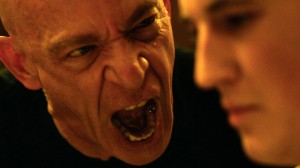 The beat goes on. And on, although maybe not at exactly the right tempo, at an upscale New York music academy where teacher Terrence Fletcher (J.K. Simmons) rules with an intensity that makes the drill sergeant from “Full Metal Jacket” look positively warm and cuddly by comparison.
The beat goes on. And on, although maybe not at exactly the right tempo, at an upscale New York music academy where teacher Terrence Fletcher (J.K. Simmons) rules with an intensity that makes the drill sergeant from “Full Metal Jacket” look positively warm and cuddly by comparison.
“Whiplash” sees Andrew Neyman (Miles Teller) work toward his dream of becoming the best jazz drummer of all time. Taken under Fletcher’s wing, he is given a spot as an alternate in the school’s prestigious studio band. His job is to observe and turn pages of sheet music for the ensemble’s regular drummer but from the first day Fletcher seems to be by turns goading and encouraging Andrew, building him up only to tear him down. “Were you rushing or were you dragging? If you deliberately sabotage my band, I will gut you like a pig.” In an effort to impress his hardnosed teacher Andrew practices until his hands bleed, covering his cymbals in a fine mist of blood. But it may not be enough, and though Andrew has given his life to his studies, even dumping his girlfriend (Melissa Benoist) so she won’t be a distraction, he still might not have what it takes to be one of the greats in Fletcher’s eyes.
“Whiplash” is part musical—the big band jazz numbers are exhilarating—and part psychological study of the tense dynamics between mentor and protégée in the pursuit of excellence. The pair is a match made in hell. Fletcher is a vain, driven man given to throwing chairs at his students if they dare hit a wring note. He’s an exacting hardliner who teaches by humiliation and fear. “There are,” he says, “no two words in the English language more harmful than good job.”
Andrew is a loner who belittles anyone whose ambitions aren’t as lofty as his—and that’s pretty much everyone. He cares more about Buddy Rich than the real people in his life.
The toxic mix of perfectionism, ambition and hubris meet in a perfect storm, and, “Black Swan” style has serious repercussions for both teacher and student.
Director Damien Chazelle doesn’t miss a beat in presenting the complicated relationship. He draws inspiration from a famous story of Jo jones and Charlie Parker. Jones famously threw a cymbal at Parker after a lackluster solo, prompting the sax plkayer to go away, practice for a year and return as one of the greatest musicians of the twentieth century. Teaching through fear and intimidation is the message, and while we’ll never know if Andrew ever reaches Charlie Parker levels, Fletcher certainly emulates Jo’s methods.
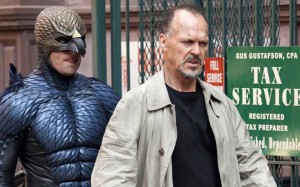 Every now and again a movie comes along that is so artfully weird, so unconventional in its approach and ethos, that it defies description and earns a recommend even though it isn’t completely successful in reaching its loft goals. “Birdman or (The Unexpected Virtue of Ignorance),” the new film from “Babel” director Alejandro González Iñárritu, is that movie.
Every now and again a movie comes along that is so artfully weird, so unconventional in its approach and ethos, that it defies description and earns a recommend even though it isn’t completely successful in reaching its loft goals. “Birdman or (The Unexpected Virtue of Ignorance),” the new film from “Babel” director Alejandro González Iñárritu, is that movie.
In what may be the most meta casting coup of the year Michael Keaton plays Riggan Thomson, a former movie star whose fame floundered when he left the “Birdman” franchise of super hero movies. Twenty years later with his money running out, he makes a comeback bid in the form of a Broadway show based on a Raymond Carver novel. Surrounded by family—daughter Sam (Emma Stone)—friends—BFF Brandon (Zach Galifianakis)—intense actors—played by Edward Norton, Andrea Riseborough and Naomi Watts—and a nasty theatre critic (Lindsay Duncan) who resents movie star Riggins for taking up space in a theatre that could have been used for art, he fights to reestablish himself as a serious actor.
“Birdman” could have been a stunt film. The casting of “Batman” star Keaton as a washed up former superhero is inspired but mostly because he hands in a performance that rides the line between comedic and pathos. “I’m the answer to a Trivial Pursuit question,” he says.
It doesn’t feel like stunt casting because Keaton plays the truth of the situation and not just the situation. His Riggins is obnoxious, self-absorbed and yet earnest in his desire to create great art. Keaton plays it all, wallowing in a stew of self-pity—he says he looks like “a turkey with leukemia.”—and ego while never once trying to appeal to the audience’s good graces. It’s a bravura performance that is the beating heart of this strange beast.
The supporting actors also impress. As an extreme method actor with an uncompromising attitude toward acting and fame—“Popularity is the slutty little cousin of prestige,” he says—the movie gives Ed Norton the most interesting and challenging part he’s had in years, and Watts is a suitably seething mass of insecurity and sexuality.
Also dazzling is the movie’s style. Filmed to look like one continuous steady-can shot, “Birdman” is as much a technical feat as it is an artistic one. Again, what could have been a stunt turns into a visual rollercoaster that propels the action forward constantly while creating a unique and stylish palette for the story.
But it doesn’t all work. Some of the insight is a bit too on the nose—“You’re no actor. You’re a celebrity.”—and labors to hammer home it’s points. The spiteful theatre critic becomes a caricature of New York intellectuals, scornful of Riggin’s accomplishments in Hollywood. ”You measure your worth in weekends,” she sneers, “and give one another awards for cartoons.” As fiery as that scene is, it feels a little too easy.
That is a small quibble, however, in a movie that takes so many chances and lampoons celebrity culture by having a reporter ask Riggins, “Is it true you have been injecting yourself with seaman from baby pigs?”
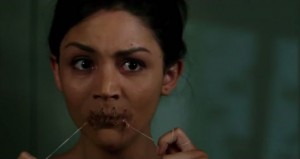 “Ouija” is scary, but not scary like Dracula, Edgar Allen Poe or hungry zombies. No, “Ouija” is scary because as I watched it I could feel my life slipping away, second-by-second, for ninety excruciating minutes.
“Ouija” is scary, but not scary like Dracula, Edgar Allen Poe or hungry zombies. No, “Ouija” is scary because as I watched it I could feel my life slipping away, second-by-second, for ninety excruciating minutes.
The first Ouija board with an alphabet on it was patented in 1890. In the late 1960s they became a household item when Hasbro’s Parker Brothers began marketing them in 1966. If you haven’t played with one, you’ve certainly seen a witchboard in the movies and know when teens start ouijiing spiritual strife is just around the corner.
The trouble in “Ouija” begins when Debbie (Shelley Hennig) breaks the first rule of witchboarding: Never play alone. She pays a heavy price for her spiritual disobedience and soon her group of good-looking friends is gathered at her funeral. “She said she’d see us the next day,” says BFF Laine (Olivia Cooke). “Why would she say that?” We’ll never know… unless Laine pulls out the Ouija Board! Using Debbie’s board Laine and pals try and contact their dearly departed’s spirit, but instead unleash a demonic terror that threatens all of their lives.
As scary as you would imagine a horror film inspired by a board game to be, “Ouija” is a mishmash of demonology, Japanese horror and so many slasher movie tropes they owe John Carpenter and Wes Craven a writing credit. The blonde girl dies first, there’s spooky stuff in the attic and the plucky heroine outlives almost everyone. At least there’s very little found footage.
The movie is 5% jump scares, those unexpected loud noises that make you twitch in your seat, 67% set-up and 28% strange glances. As Laine, Debbie’s intrepid best friend, Cooke does most of the heavy lifting. She keeps the action (such that it is) moving forward all the while displaying her mastery of the concerned look. With a furrowed brow and a determined attitude she tracks down the mystery behind her friend’s death, but mostly she just looks concerned.
More annoying than the blank stares is the movie’s habit of telling the audience the most obvious of details. “She played it alone,” whispers Laine in amazement over a shot of, you guessed it, Debbie going solo on the Ouija board. Over footage of Deb saying she found the board in the attic Laine helpfully adds, “She found it in her house!” Instead of telling us something useful, or interesting, the film makes sure that no detail, no matter how small, is commented on.
You won’t need spiritual help to figure out whether to see “Ouija” or not. The planchette (the ouija’s triangular pointer) is aimed at “No.”
 Teen angst has been good to the movies. “Blackboard Jungle” and “Rebel Without a Cause” defined that common collision of hormones and school stress for the 19560s and every decade since has offered up its own example of misunderstood, troubled youth. Heck, Kristen Stewart has made a career of playing dead-eyed teens.
Teen angst has been good to the movies. “Blackboard Jungle” and “Rebel Without a Cause” defined that common collision of hormones and school stress for the 19560s and every decade since has offered up its own example of misunderstood, troubled youth. Heck, Kristen Stewart has made a career of playing dead-eyed teens.
“Laggies” fits the mold of a teen angst film, except the main character Megan (Keira Knightley) is a clever twenty-something who never completely grew out of her angst. “I had a good feeling about you,” says one her friends. “That makes one of us,” she replies.
In the film’s opening minutes we meet Megan and her friends on prom night. They sneak cocktails, dance and go skinny-dipping. Cut to today, the four girls (Ellie Kemper) are still in touch, some married to their high school sweethearts, some, like Megan, living with her prom date Anthony (Mark Webber).
Megan is surrounded by a strong support system; adoring parents, a devoted boyfriend and friends who love her enough to ask her to be their child’s godmother.
Still, she is unsettled. That feeling intensifies when Anthony tries to propose on the night of her best friend’s wedding. A chance encounter with a group of teens, including Annika (Chloë Grace Moretz) and her sarcastic friend Misty (Kaitlyn Dever), forces Megan to reexamine her life and relationship.
Megan says she became a psychologist because she wanted to have real conversations with people and Knightly, in a lissome performance, brings forthrightness to the character… even when she is lying. It’s something different from Knightley. She’s more off hand here than we’re used to, and even though she looks like a fashion model even when she is dressed down in her teen friend’s clothes, she still radiates the teen ennui that defines her character. We see her working through it, trying to figure out what she wants, but for now she is an unemployed woman with a degree who still flops herself on parents’ couch demanding pizza night.
Moretz and Dever also impress. In some ways Annika is more grown up, yet more confused than Megan. They mentor one another, and Moretz brings real vulnerability to the role. Less vulnerable but way sassier is Dever’s Kaitlyn who embodies the eye rolling best friend in every teen movie.
The role of the grumpy father, and this case also love interest, is ably taken by Sam Rockwell. He’s stern but funny—he says Annika and Kaitlyn are “like gerbils; they have no sense of time.”—but never feels like a caricature. None of the characters do. The story may have some questionable moments but the characters don’t.
“Laggies” director Lynn Shelton has a deft touch with characters—as witnessed in her other films “Humpday” and “Your Sister’s Sister”—but has relied a bit too heavily on rom-com conventions. It’s a satisfying movie, it’s too bad it settles for a standard ending.